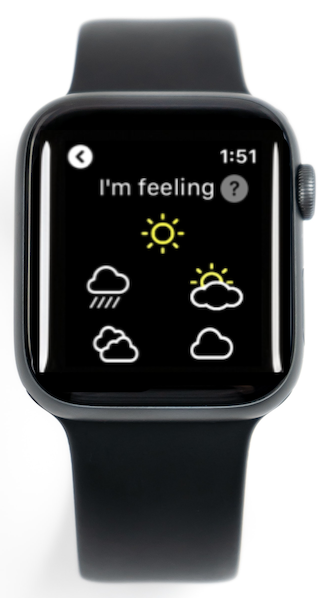The COVID-19 pandemic created a new reality where the demand for online mental health interventions has exploded. Now more than ever, health institutions and counselling facilities are offering digital therapies for mental health difficulties like depression.
A core component of most therapies is self-monitoring. A common self-monitoring activity consists for patients to keep track of their mood and some life habits that may influence it, for example sleep and physical activity. By reflecting on these daily events, a person can better understand how their lifestyle may have a positive or negative impact on their mood.
We are conducting a clinical trial exploring a way to make self-monitoring easier, with something that many people already have: a smartwatch.
Most of digital therapies already use a mobile app. So, why did we choose to integrate a smartwatch? Several reasons behind this choice. The most obvious one: evidence shows that some tasks are much easier to do on a watch than on a mobile phone or computer. Secondly, the smartwatch is a wearable device that shows interesting capabilities in terms of data capture. Patients may find it difficult to remember when they went to bed, got up, and how long they’ve exercised for each day. With its embedded sensors, the watch can automatically collect sleep patterns and physical activity. This automatic collection has two benefits: it provides a more accurate monitoring and, at the same time, helps reduce the patient burden. Finally, the watch’s proximity to the human body allows the person to record their mood via a quick, discreet, and natural Ecological Momentary Assessment.

Simply put, the smartwatch has a big potential to support a more accurate self-monitoring, while reducing the patient burden during therapy.
Although nowardays it is quite common to see people wearing a smartwatch, this technology is not commonly used in mental health interventions. That’s why it is essential to understand patients’ experience using a smartwatch in the context of therapy, and particularly looking at how well they accept the device. We know from previous research that technology acceptance is not something static, and so patients’ perception of the smartwatch will evolve as they use it. For this reason, our trial is measuring the evolution of patients’ acceptance of using the watch throughout their treatment.
70 patients were recruited with the help of clinicians at Berkshire Healthcare NHS Foundation Trust. Half of them are currently using the smartwatch as part of their internet-delivered treatment for depression.
Click here to find out more in the clinical trial protocol
Nadal, C., Earley, C., Enrique, A., Vigano, N., Sas, C., Richards, D., & Doherty, G. (2021). Integration of a smartwatch within an internet-delivered intervention for depression: Protocol for a feasibility randomized controlled trial on acceptance. Contemporary Clinical Trials, 103, 106323.


